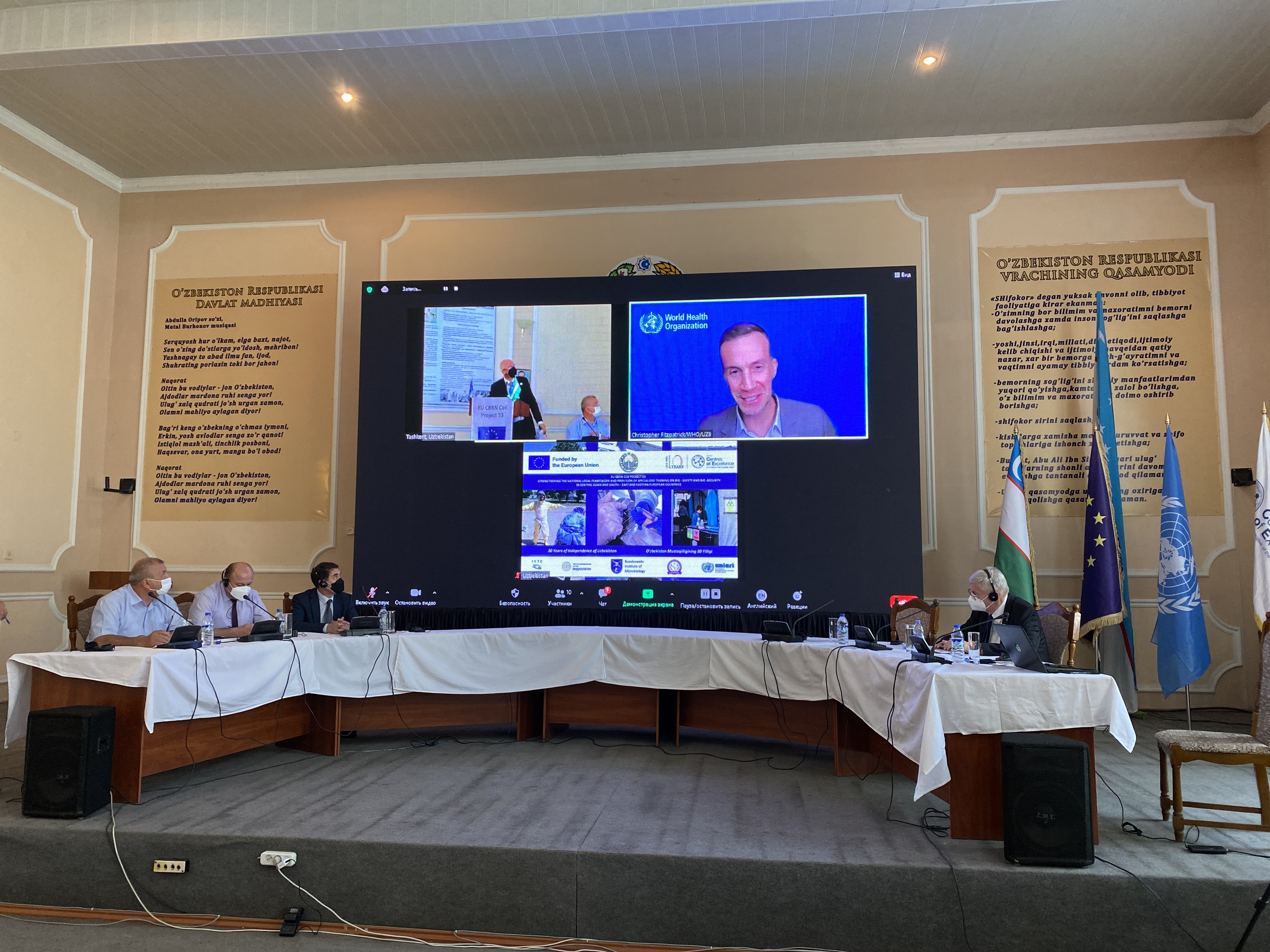European Union hands over two rapidly deployable diagnostic laboratories to Republic of Uzbekistan, provided under EU Chemical Biological Radiological Nuclear Risk-mitigating Centres of Excellence Initiative - Project 53

Outbreaks of infectious diseases pose a substantial risk for public health, especially in remote regions where the disease surveillance infrastructure often is limited. In general, qualified laboratory specialists, diagnostic capabilities are located in cities, while rural communities often have limited access to such public health resources. However, in local outbreaks and pandemics it is critical that such resources are available in these locations to support the local population and prevent potential larger outbreaks.
To support the Republic of Uzbekistan with such capacity needs, as within its territory it has large, thinly-populated areas, the European Union (EU) provided two rapidly deployable diagnostics laboratories under Project 53 of the EU Chemical Biological Radiological Nuclear Risk-mitigating Centres of Excellence Initiative (EU CBRN CoE). These mobile laboratories will increase Uzbekistan’s capacities to prevent, prepare for and respond to biological risks.
The two mobile laboratories were handed over on 14 July 2021 to two leading public health institutes of the Ministry of Public Health of the Republic of Uzbekistan: the Republican Specialized Scientific and Practical Medical Center for Epidemiology, Microbiology, Infectious and Parasitic Diseases and the Research Institute of Virology. Specialists from these institutes will be trained by experts from the German Bundeswehr Institute of Microbiology (IMB) over the coming year on the use of these mobile laboratories. In total this effort is to the order of 13.8 billion UZB Sum (1.1 million EUR).
During the handover ceremony of the laboratories, Mr. François Begeot, Head of Cooperation of European Union Delegation to the Republic of Uzbekistan, noted ‘’With infectious diseases, nobody is safe until everybody is safe. It is crucial to have an inclusive health system that can reach out even to the most remote areas. The mobile laboratories will enhance the Government’s ability to react to biological threats wherever they arise and to leave no one behind. ‘’
Mr. Bakhodir Yusupaliyev, Ministry of Public Health of the Republic of Uzbekistan, stated that “Today the world continues to be stressed by the COVID-19 and unfortunately the global biosafety is in danger. In light of the last epidemiologic situation, together, internationally we must continue the struggle against the pandemic of the 21st century.”
Mr. Bakhtiyor Gulyamov, the Head of the State Committee for Industrial Safety & Head of the EU CBRN CoE Regional Secretariat for Central Asia, stressed “Today we are witnessing a great and invaluable support from the EU and ISTC within the framework of project 53. This year, as part of this project, 2 modern mobile laboratories were delivered as humanitarian aid, and currently Uzbek specialists are trained by experts from the Institute of Microbiology of the Bundeswehr of the Germany. This is a significant event for us, since the receipt of mobile laboratories is timed to the 30th anniversary of the Independence of the Republic of Uzbekistan.”
The EU CBRN CoE Initiative is funded and implemented by the European Union in cooperation with the United Nations Interregional Research Institute on Crime and Justice (UNICRI) in 62 countries. The program contributes to the capacity-building of partner countries in Central Asia to counter CBRN threats, including coronavirus.
During the COVID pandemic, the Initiative has supported the Central Asia countries (such as through Project 53) with provision of Personal Protective Equipment for medical staff, diagnostic equipment, kits and supplies for diagnostic facilities, support for a diverse array of training activities to support front-line workers in keeping themselves and the general public safe, and conducting multiple webinars where experts exchanged best practices on various aspects of the ongoing pandemic.
The Project 53 was conceived and funded within the framework of the EU CBRN CoE (www.cbrn-coe.eu) initiative. The CoE currently covers 8 regions and 62 partner countries. The EU CBRN CoE Secretariat for Central Asia is based in Tashkent, Uzbekistan. It works in partnership with countries to encourage local ownership of CBRN action plans, policies and joint preparation of regional project proposals. The International Science and Technology Center (www.istc.int), implementer of Project 53, has funded and managed several hundred projects in Central Asia over the past 25 years.
https://1drv.ms/u/s!AtO74xO3T215jCb6ac1oNMWbnEo_?e=WgAMmO
http://https://uztv.tv/channels/uzbekiston-24/22-07-2021/46c44042-7e3a-4b90-b42f-4f9361080051

